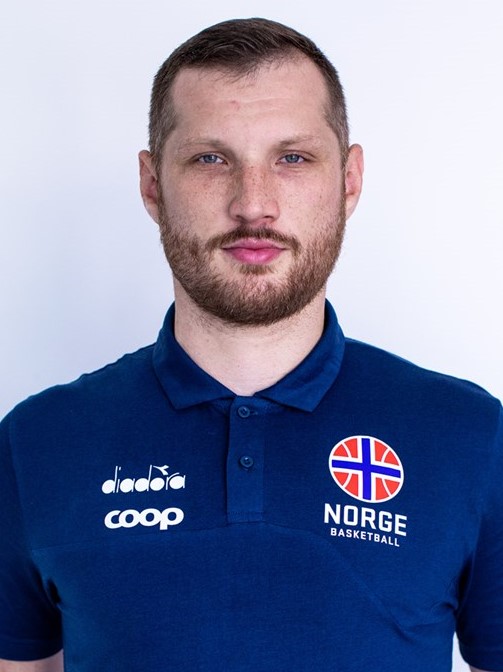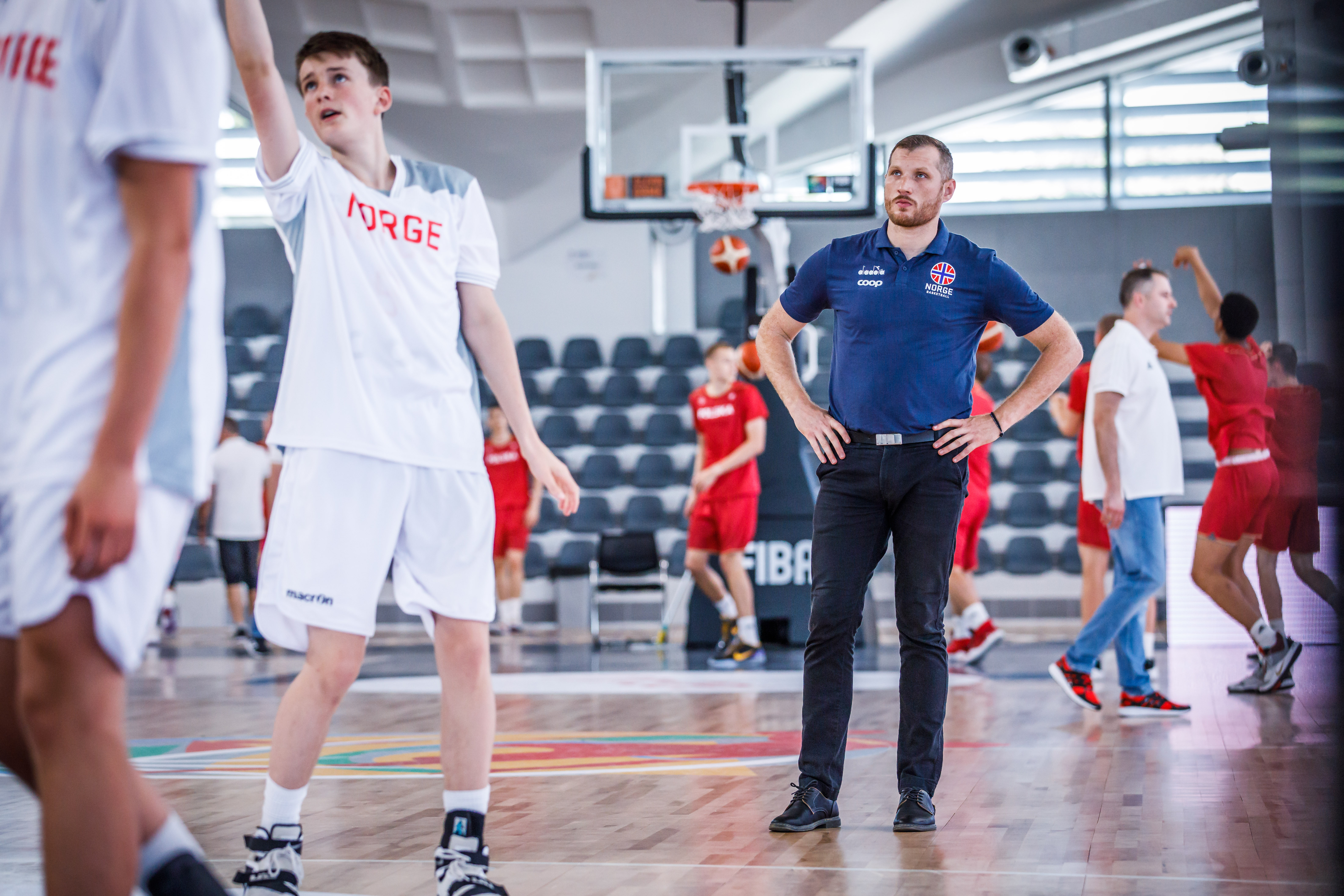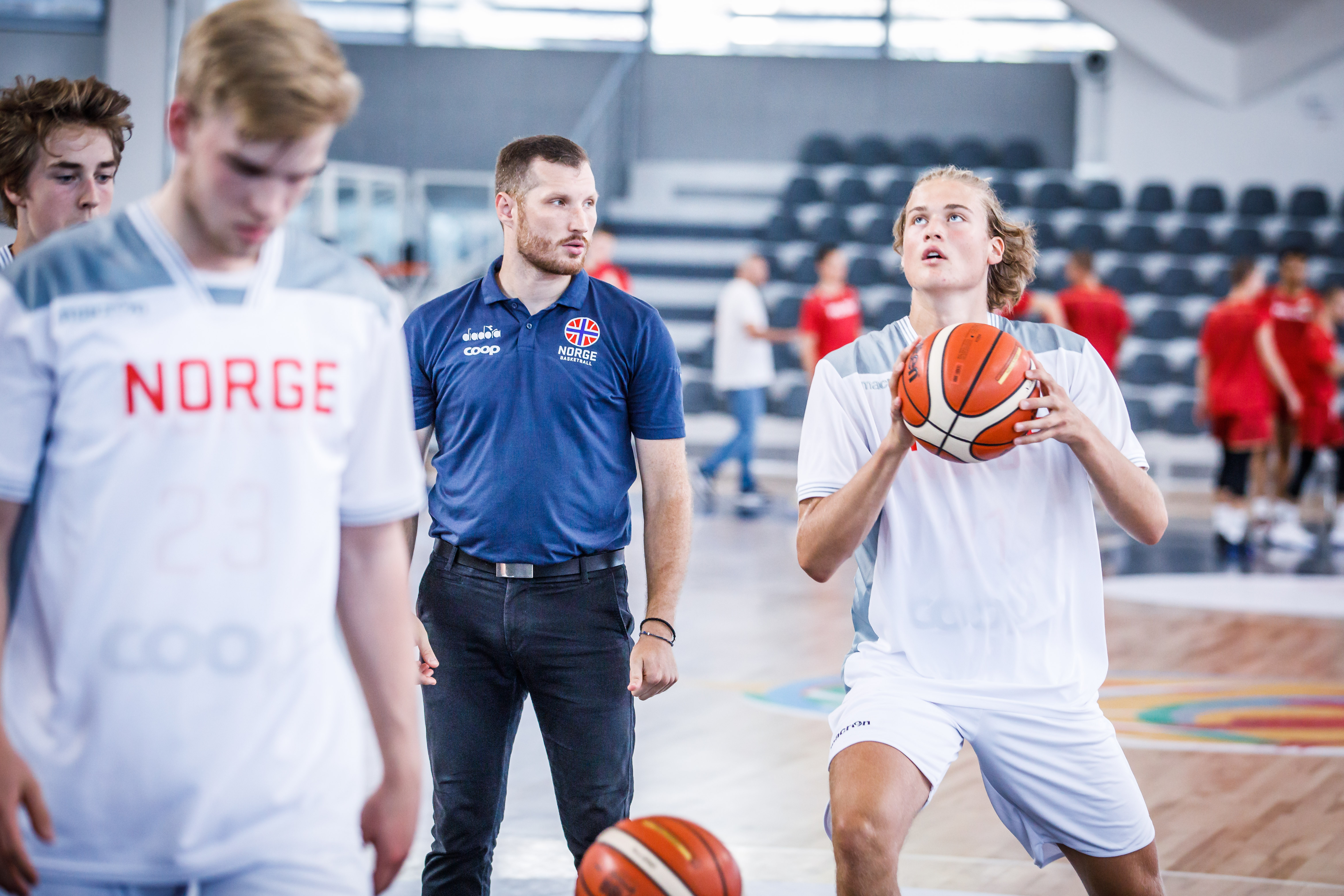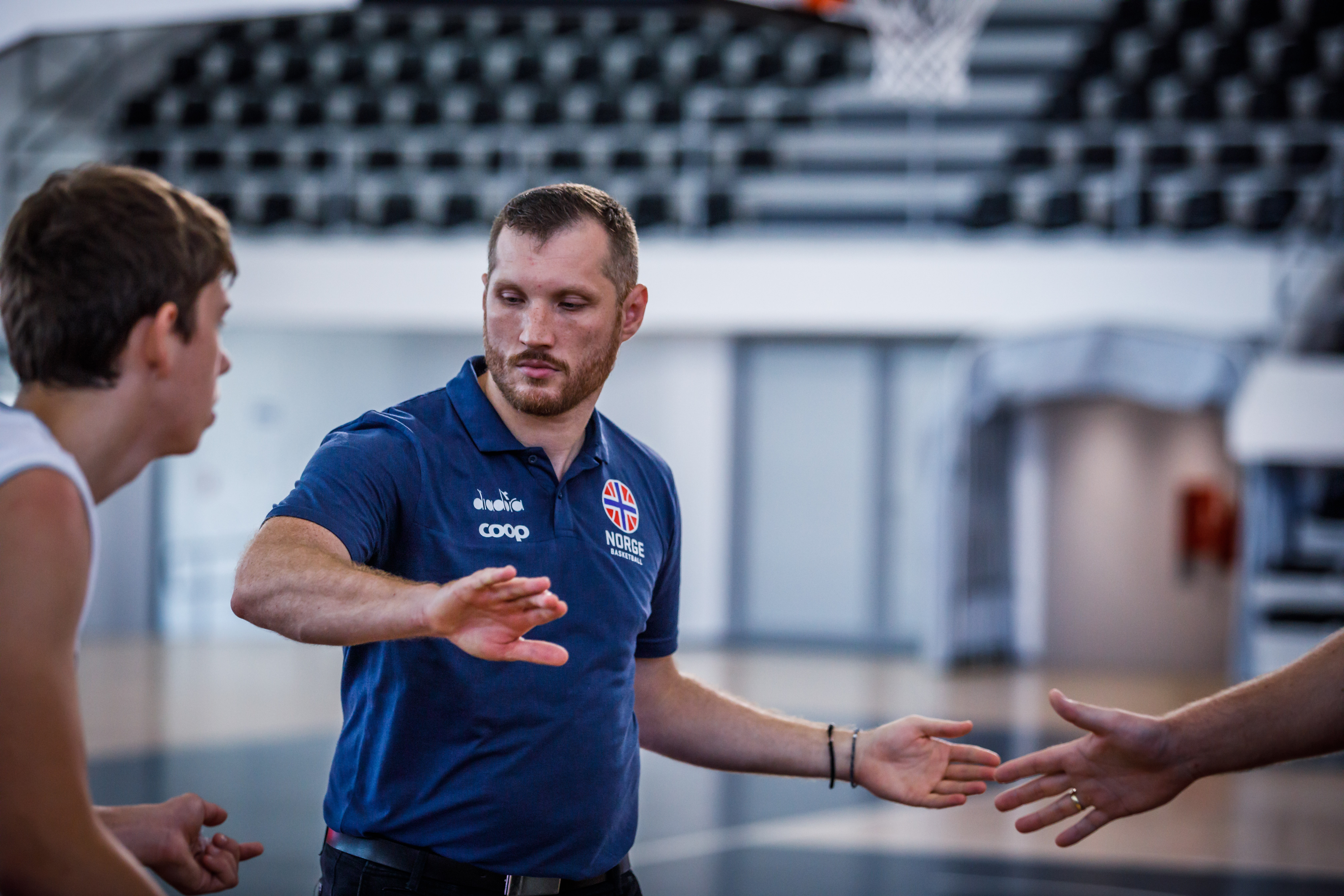Vi har intervjuet en del trenere for å høre hvordan de aktivt jobber for å utvikle seg som trener og hva deres synspunkter er på hvordan man kan bli en trygg og god basketballtrener. Vi har snakket med trenere som trener lag i EB, U14-U16 og er trener på Region Øst Spillerutviklingsprogram.
Dette intervjuet er på engelsk.
Vasileios Tsernisof
Basketballcoach in EB-85 and at NTG
Vasileios is a Professional basketball coach from Greece and have a University degree in sports education with a specialization in basketball coaching. He has been working as a basketballcoach in Greece and the last 4-5 years here in Norway, first with TNT Towers and now in EB-85, NTG and OIS (Oslo International School). Vasileios has been a coach for Region Øst at our SPU program (due to Korona there is no SPU at the moment) and the U16 Norwegian National Team.
What do you think are good qualities for a basketball coach?
Anyone can be a good coach it just takes hard work and commitment as anything else we do if we want to be good on that. So, in my opinion, some of the good qualities describe a good coach means that Coach:
- Should be a person worthy of respect, this means that he must be dignified with leadership skills in order to be appreciated by his players.
- Should have the relevant knowledge on what he is doing and he should try to enrich them constantly.
- Should be dedicated to his job, to be organized, and to be consistent with his obligations.
- Must present what he is and not pretend, to be enthusiastic but also courageous to convey his courage to his athletes.
- He must show interest individually for each athlete and have the ability of motivation, and motivate each athlete individually.
- Should have the ability to enforce discipline, that means he has to be able to draw up a policy of laws and regulations but also to be possessed by a fair and correct judgment and decision-making... Should be honest.
- And at last, perhaps the most important thing, every coach should have a sense of good humor. Humor at the right time helps to create a pleasant atmosphere and great motivation.
What is it you like most about being a basketball coach?
Ever since I can remember myself, I am always a social type and through basketball, I like to meet many different people with different ideologies and cultures. It's fantastic to know this feeling - especially when working with children - that your presence will serve as a model, which for the coming years and a large part of their lives will shape their character, but will also give them the values that will follow for the rest of their lives. I don't hide the fact that I feel happy when many times the parents ask me to tell their child, for example: "tell him to eat his vegetables" he will listen to you because you are his coach.

What have you learned about Norwegian basketball? Since you have Greece to compare against?
Although Norwegian basketball is still at a low level in its early stages in comparison to Greece, which has a history of 100+ years, During the last 4-5 years of living in Norway, I realized that Norwegians are an organized people and very consistent in their commitments. If all this is passed on to basketball, then I believe that its development is a matter of time...
That's why I decided to stay in Norway because I want to be a part of and witness this development.
What do you think is important to practice from U10-U14? What skills.
What each child will be taught at any given age often depends on each child's level of knowledge and experience. But let's say a kid ages 10-12 starts playing basketball, then the main elements in which in my opinion a child should work are:
- Teamwork, communication, and in general everything has to do with his integration into the team so that he feels comfortable and happy and can trust everyone as he would trust himself.
- Dribbling, passing, and shooting in their simplest forms are the skills that need to be taught and perfected at this age.
- And most importantly at this age, I would say the child should be taught "work ethic" and the combination of "enjoyment" with "hard work" which will probably play the most important role in his later career as a basketball player.
What is most difficult about being a basketball coach?
The hardest thing about being a coach I would say is that you have to be a role model for your athletes on and off the court. You have to be very careful about how you speak and behave. Many times the fact that you are an active player, a fan, or even where you hang out and what you eat in front of them makes it difficult. These are examples that if you do not follow them yourself you will not be able to demand them from your athletes. Imagine you just went out from Mac Donald’s and meet an athlete from whom you have a requirement always eat healthily, how you going explain to him that you only visit here once a year.
Also, a difficult thing in coaching is that you have to get along well with everyone, especially when basketball, like any other sport, is competitive and you often clash with coaches, referees, and parents who don't always agree with your philosophy or your choices. But as a coach, you have to keep in mind that in the end, it's just a game. In particular, in my case coming from a country and basketball culture where voice and intensity in a game are the key elements, I am often misunderstood here in Norway. However, I believe that during these 4-5 years I was helped a lot by the combination of these two cultures, in order to find the middle ground and always achieve the desired result.

What do you do to recruit new players?
In my opinion, it is not difficult to bring a child to the club/team but to make him stay, for a child (especially at a young age) the essence is the game and pleasant training. They are not interested in the type of sport but where they have a good time and feel valued. From the moment the child feels comfortable and has a good time, he can even stay forever. Let's not forget that the little ones are the strictest and most honest judges.
So what I have as a principle is what I call «infect them with the basketball virus» and I manage to do that by being ready to welcome each child individually and have a ready workout that they will never forget and when they get home they want to come next time. If this succeeds, recruiting is done on its own, one child brings his friend, the friend his friend and so on…
And as an example I can mention my course this year in EB, I started personally with 4 classes and a total of 46 children and in just one year this number increased to a total of 114 children !!! Of course, this effort is further strengthened when you have the support and promotion of your philosophy and practices from a strong and organized club like the one that I work with now.
What is your tip to future basketball coaches?
As I mentioned before, many points can describe a good coach, but some basic things that I try to keep as a coach and would advise others are:
- Always have a philosophy and a plan that you follow, don't try to imitate other coaches, try to get your coaching personality… how will you do it?
- Be consistent and constantly try to improve, it means to read and constantly look for new things and ideas and accept the fact that you are not the perfect coach and there is always room for improvement in your coaching career. Be humble and bold. Humble in learning, bold in action.
- Always come to practice with a daily plan with which you worked from home even for the training that you consider insignificant, you can't imagine how much you can gain from it with an organized plan.
- Implement fitness training into your practices and if you have the opportunity, do a special practice only on fitness training. Nowadays in modern basketball, the athleticism of a player is the key element.
- During your practice, be serious, clear, and consistent (your prepared plan will help you with this), always explain the way of your thinking to the players and what you demand from them (eg Demonstration of drills).
- And perhaps most important of all, try to develop the right communication between you and your athlete. Many of your players will follow you for your character and not so much for your knowledge. Don't just be their teacher or parent, try to make them see you AND as a friend or as their big brother, only then they will play for you.
What do you think that Region Øst can do to support coaches and help them develop?
I believe that the improvement of a coach can be done by comparison, self-criticism, and gaining experience. This practically means that if a coach wants to improve, he will have to gain as much experience as possible by comparing himself to practices, ideas, and other coaches. To do his self-criticism and to benefit from his own mistakes, that is, to gain new experiences. In my opinion, in this case, could help:
- More and different educational seminars for experienced coaches.
- Perhaps some educational trips to basketball-developed countries e.g. USA, Spain, Serbia, Greece, for watching the training, games and basketball culture of each country. This way the coaches could compare and get ideas based on their ideology and basketball culture.
- Coaches could be given by Region East a general plan of basketball philosophy for and how they should train and on what issues to train. So that all coaches follow a common line and the same rules.
- It would be good if there was a way for the Region East to follow, evaluate, and feedback on the course of the coaches during the year.
- And perhaps a way should be found to give Norwegian coaches an incentive (eg sponsorship, prizes, bonuses, salary) to make them take coaching more seriously and professionally and not just voluntarily because they love the sport, or because of their child, they do coaching volunteering.

What is your suggestion to the players during this Korona-time?
I believe the best advice we could give, especially in this difficult time we are all going through, is to motivate them to be patient and think only positively, focusing on their individual development and progress.
Basketball is not only a technical and physical condition sport but also a game of intelligence and mind and so it is important to keep their mentality high…. I often remind my athletes they shouldn’t give up especially now because “corona time will end soon, but basketball will last forever”.
What would you as a coach like the players to focus on?
Every child has different needs and things that need to be improved. So, the focus for each child is different and I usually try to have personal discussions with my athletes to achieve this.
Because many times, not all children have the same opportunity to follow the same training, for example, some have basketball in their yard and some do not, some can train in the garage while some live in an apartment.
So, with the discussion, I try to learn better my athletes and about their needs and adjust their training according to their capabilities.
But the most important thing is to remind them that:
“Any kind of practice, is a good practice"
like I always say to my athletes.
Du kan lese flere intervjuer med trenere her:
Trenerrollen del 1 - Intervju med Josephine Traberg
Trenerrollen del 2 - Intervju med Ole Andreas Teigen
Jenter i basketball del 1 - Intervju med Nina Østengen og Rune Andersen
Jenter i basketball del 2 - Intervju med Christian Deisz
Jenter i basketball del 3 - Intervju med Niels Mathiessen
EasyBasket Trener del 1 - Intervju med Shiba Haji Ahmadi
EasyBasket Trener del 2 - Intervju med Niclas Ellingsen
EasyBasket Trener del 3 - Intervju med Ragnhild Riis
EasyBasket Trener del 4 - Intervju med Bjørnar Holsæther
